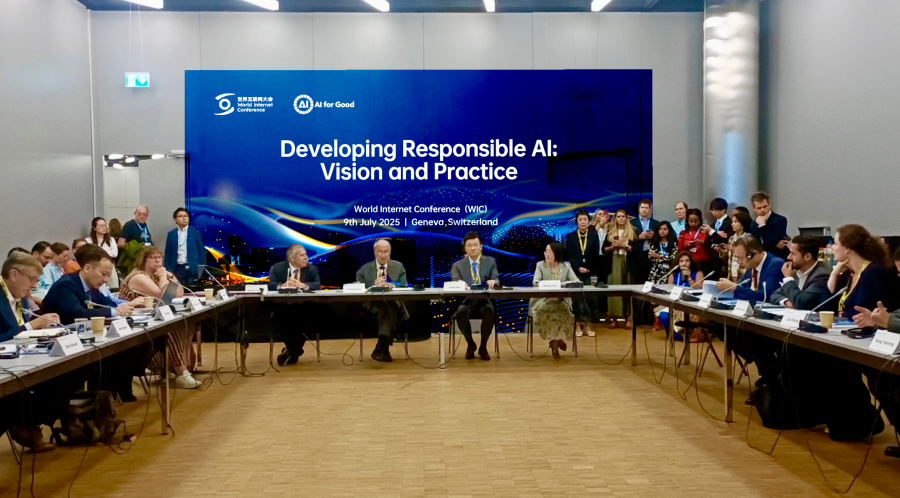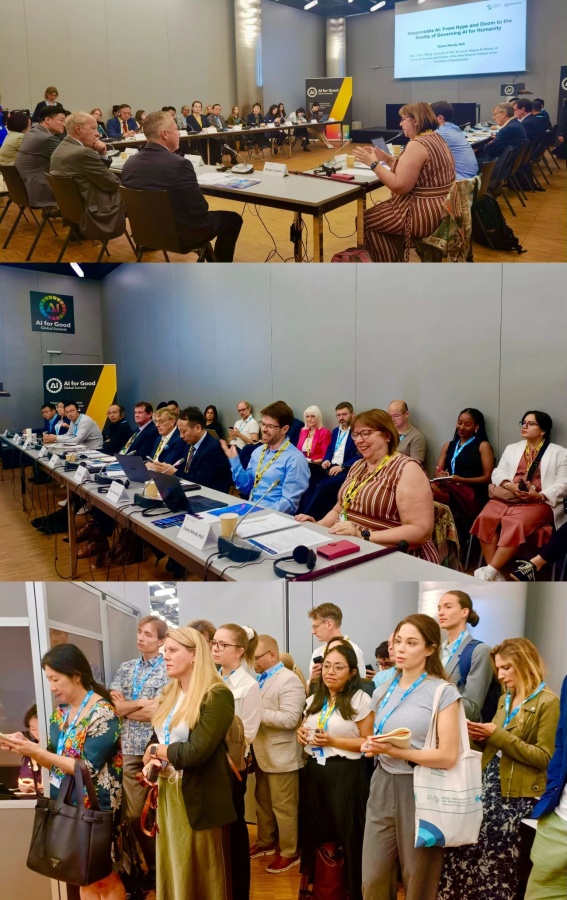
- Home
- Media Center
-
Events
- Wuzhen Summit
- Regional Forums
- Practice Cases of Jointly Building a Community with a Shared Future in Cyberspace
- World Internet Conference Awards for Pioneering Science and Technology
- The Light of Internet Expo
- Straight to Wuzhen Competition
- Global Youth Leadership Program
- WIC Distinguished Contribution Award
- Membership
- Research & Cooperation
- Digital Academy
-
Reports
- Collection of cases on Jointly Building a Community with a Shared Future in Cyberspace
- Collection of Shortlisted Achievements of World Internet Conference Awards for Pioneering Science and Technology
- Reports on Artificial Intelligence
- Reports on Cross—Border E—Commerce
- Reports on Data
- Outcomes of Think Tank Cooperation Program
- Series on Sovereignty in Cyberspace Theory and Practice
- Other Achievements
- About WIC
- 中文 | EN

WIC hosts workshop on responsible AI in Switzerland
On July 9, the World Internet Conference (WIC) hosted a workshop on "Developing Responsible AI: Vision and Practice" during the AI for Good Global Summit 2025 organized by the International Telecommunication Union (ITU) in Geneva, Switzerland.
The event brought together members of the WIC Specialized Committee on Artificial Intelligence (SC on AI), renowned AI experts, and representatives from governments, international organizations, universities, and think tanks. Francis Gurry, vice-chairman of the WIC and former director general of the World Intellectual Property Organization, delivered the opening remarks. The session was chaired by a WIC representative.

Focusing on the vision for responsible AI development as well as practices and experiences in this area, the workshop explored core concepts, cutting-edge practices, standards development, and governance frameworks necessary for responsible AI.
Participating experts agreed that responsible AI is not only a growing trend but also an essential requirement for the global AI development. They emphasized the importance of embedding ethics, safety, fairness, and transparency throughout the entire AI lifecycle—from research and development to deployment and application—to fully unlock AI’s potential and ensure it benefits humanity.
The workshop made recommendations for responsible AI advancement:
First, we need to establish a multi-level collaborative governance framework. Ethical guidelines, legal systems, and supporting technical standards must evolve in step with technological advances to provide a strong institutional foundation for responsible AI.
Second, we need to enhance technical safeguards and transparency. Greater efforts should be made to advance key technologies such as robustness, privacy protection, and bias detection, in order to support the implementation of governance frameworks and standards.
Third, we need to strengthen global dialogue and capacity-building. International exchanges in AI development and governance should be deepened, with a focus on inclusive participation and capacity building in emerging economies to ensure equitable access to the benefits of AI and to help bridge the global digital divide.

Key speakers at the event included Liang Hao, executive deputy secretary-general of the WIC; Frederic Werner, chief of Strategy and Operations at TSB of ITU; Wendy Hall, chair of the WIC SC on AI and associate vice-president (International Engagement) and director of the Web Science Institute of the University of Southampton; Zeng Yi, co-chair of the WIC SC on AI, co-lead of the AI Safety and Governance Program of the WIC SC on AI and professor at the Institute of Automation at Chinese Academy of Sciences; and Seán Ó hÉigeartaigh, co-lead of the AI Safety and Governance Program of the WIC SC on AI and director of the Centre for the Future of Intelligence at the University of Cambridge. They shared insights on governance frameworks and ethical principles in AI development.
Wei Kai, co-lead of the Standard Promotion Program of the WIC SC on AI and director of the Artificial Intelligence Research Institute at the China Academy of Information and Communications Technology; Moises Maldonado, data scientist and innovation officer at the United Nations High Commissioner for Refugees; Liudmila Zavolokina, professor of Digital Innovation and Information Systems at the University of Lausanne; Pan Feng, deputy director of the Cyberspace Administration of Beijing; John Higgins, co-lead of the Standard Promotion Program of WIC SC on AI and co-founder and chair of Global Digital Foundation; Luo Zhong, chair of SG21, ITU; and Chris Brown, Special advisor to the Standard Promotion Program of the WIC SC on AI and Director of UK-ASEAN Economic Integration Programme, British Standards Institution, provided perspectives on global collaboration and industry practices for responsible AI.
Looking ahead, the WIC will continue to serve as a global platform for exchange and mutual learning. Through its SC on AI, and via programs of standard promotion, industry development, and AI safety and governance, the WIC will enhance international cooperation by organizing workshops and joint research, to drive the healthy, orderly, and sustainable development of AI worldwide.

The World Internet Conference (WIC) was established as an international organization on July 12, 2022, headquartered in Beijing, China. It was jointly initiated by Global System for Mobile Communication Association (GSMA), National Computer Network Emergency Response Technical Team/Coordination Center of China (CNCERT), China Internet Network Information Center (CNNIC), Alibaba Group, Tencent, and Zhijiang Lab.





